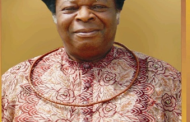Before the drama ended, no less than a dozen African trade union centres were up in arms to free him from the jaws of power at the International Airport in Harare where he was being detained.
Couched in the language of street battles by which they do it, the Nigeria Labour Congress, (NLC) which appears to be finding its voice again thundered, “Release Mr Amankwa Now”. The Congress of South African Trade Unions, (COSATU), condemned in the strongest terms, to use its own words, the detention of the ITUC-Africa General Secretary, Comrade Kwasi Adu Amankwah. It went on to say how it is not so surprised by the action of the security forces in Zimbabwe: “we know too well it is in the DNA of the Zimbabwean regime to behave in this manner”.

‘Scorpion’ Sir, there are new rulebooks in town on use and misuse of power. We probably need to get some, eh!
From Freetown, Sierra Leone on the West Coast, the language was no different. “The Sierra Leone Labour Congress wishes to condemn in the strongest terms, the arrest and repatriation to the airport preparatory for possible deportation, of Mr Kwasi Adu Amankwa, Secretary General of ITUC-Africa by the Zimbabwean authorities in Harare”. That was the opening sentence. The next was no less in rhetorical pugilism. It says that the arrest of Mr Amankwa represented the height of intolerance and repression, explaining how the labour diplomat was in Zimbabwe on an international solidarity meeting with the Zimbabwean Congress of Trade Unions (ZCTU).
The Federation of Somali Trade Unions, (FESTU) followed in terms of the same language. It was as if those who drafted the statement went through a central couching process on it. From Lome in Togo where the International Trade Union Confederation, (ITUC) has its regional office, Mr Adrien Akouete, the detainee’s deputy flashed a protest to President Mnangagwa of Zimbabwe on “Maltreatment and Detention of an African Trade Union Leader: A Call for a Swift Intervention from the Office of the President of Zimbabwe”. That was the header.
And on and on and on. It has not been that clear before that the tension between African national labour centres and the regime in Harare is so much tense. The arrest and restriction of the labour diplomat brought that out most unmistakably.
It is probably good that The Presidency in Ghana has intervened and Mr Amankwa has breathed freedom. The Zimbabwean authorities and the African national labour centres do not have to wrestle each other anymore. At least, not for now. But, what exactly explains why Amankwa got into trouble on arrival in Harare?
It must have to do broadly with my enemy’s enemy being my enemy. National labour centres in Africa are rarely friendly with African governments. The contradictions between the interests each serve are such that it will be puzzling to find the two cozying up to each other, even in those African countries where some variant of socialists have been in power. A fighting Zimbabwean Congress of Trade Unions (ZCTU) must be an enemy of the Zimbabwean authorities, making any friend of ZCTU to be an enemy of the regime, irrespective of whether this ‘enemy’ is on a mediation mission.
The question remains. It arises from one of the paragraphs in the statement by the NLC. The paragraph said, “That government, in spite of the global outrage against its ill-advised behavior, could arrest Mr Amankwa, a diplomat in his own right and without any stated offence, signifies how far it is prepared to go on its mission of repression”. The question is whether the NLC could be right. That is in its inference that the Zimbabwe regime is on a mission of repression, a mission it is determined to go far. If this is right, then might Africa not have a problem on its hand as far as crisis and its management in Zimbabwe is concerned? As bad as the quality of governance is across Africa, most of the leaders sustain themselves now more on propaganda rather than detention of those who do not agree with them. Might the old scripts of power still be circulating in the Presidential Villa in Harare?




























